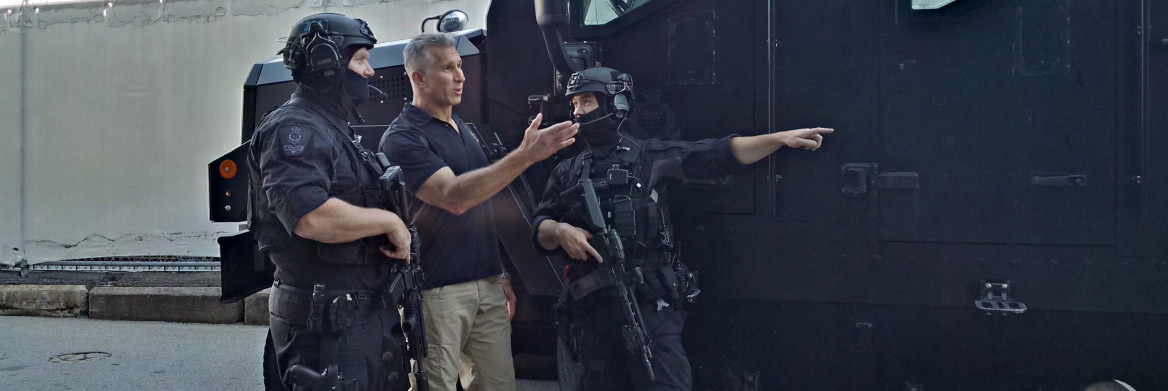From the front line to the big screen, Insp. Jeff Harris has trained for it all. With nearly 30 years' policing experience and dozens of certifications under his belt, Harris works with directors to create authentic police scenes in movies and TV shows. Amelia Thatcher put the spotlight on Harris to find out how he keeps up with policing — on and off camera.
What kind of police training have you done?
I started with the RCMP in 1987, and my sergeant at the time was very supportive of ongoing learning. I took as many courses as I could — small vessel operators, breathalyzer course, radar course — before joining the Vancouver Police Department in 1991. I'm a bit of an adrenaline junkie. I enjoy the thrill of the road and the hot calls, and so I joined the Emergency Response Team (ERT). The ERT was a goldmine for training and experience — I learned things like hostage rescue, warrant service, sniping, witness and VIP protection, motorcades, prisoner transfer, and working with the military. Every little bit I could grab, I would.
How did you get into advising for movies and TV?
In 1995 I became a background actor for TV, specifically a special skills actor as a cop. I was acting for a scene when I noticed a police officer had been brought in to be an expert on bomb scenes. I'm listening to him telling the director what he should do, and I'm thinking, 'This guy has no idea what he's talking about.' So ultimately I jumped in and said, 'I'm a reserve ERT member and I've been trained in explosive disposal and this is actually what you would do and this is how we investigate bomb threats.' I've been advising ever since on everything from TV shows to major motion pictures like X-Men 2 and Rise of the Planet of the Apes.
How does your police training help you advise?
Directors, producers, writers and actors ask for my help to make police and military scenes look as real as possible. I can provide writing assistance — changing dialogue to match what a cop might say or how certain interactions would happen. I also provide weapons training for the actors — proper loading procedures, how to hold it and how to face a threat. In some cases I can help set up scenes — directors might ask, 'How would a SWAT team enter a room?' And I say, 'They'd enter here, here's your lineup, this is how they would break down the door,' and so on.
Can you give an example of advice you give?
There are a lot of smaller details the movie people don't think about. For example, in a lot of military movies you've got guys in gear with straps hanging all over the place and the wrong weapons for their task. In real life, dangling equipment is a safety hazard. SWAT guys tape everything down so they don't get caught on things. On one set, I was running around with rolls of black tape, cleaning up all the loose ends on all the costumes.
Why is it important for police maneuvers and training to be accurately depicted on screen?
The more professional and realistic a show is, the more audiences you'll draw into it, especially from law enforcement and military. Those people will watch a show more if it's more accurate to what they do. There's a ton of trained cops and soldiers out there, and they can pick up stuff right away. Accuracy is also important when you're depicting real police agencies. They look professional — when they get out of the car, their uniform is done a certain way, their gun belts are tightened up and they carry their weapons properly. So I make sure these actors aren't just throwing on the uniform. I try to get them to live in the shoes of a cop or soldier.
How do you keep up to date with training?
For me, it's all personal growth. Some courses you need to get re-certified regularly, like use-of-force or firearms training. Other times it's about jumping in with my previous team for training and asking them if anything has changed. This is what I say to other cops: as you go through your career, learn as much as you possibly can, take as many courses as you can and keep your eyes open for all opportunities.
